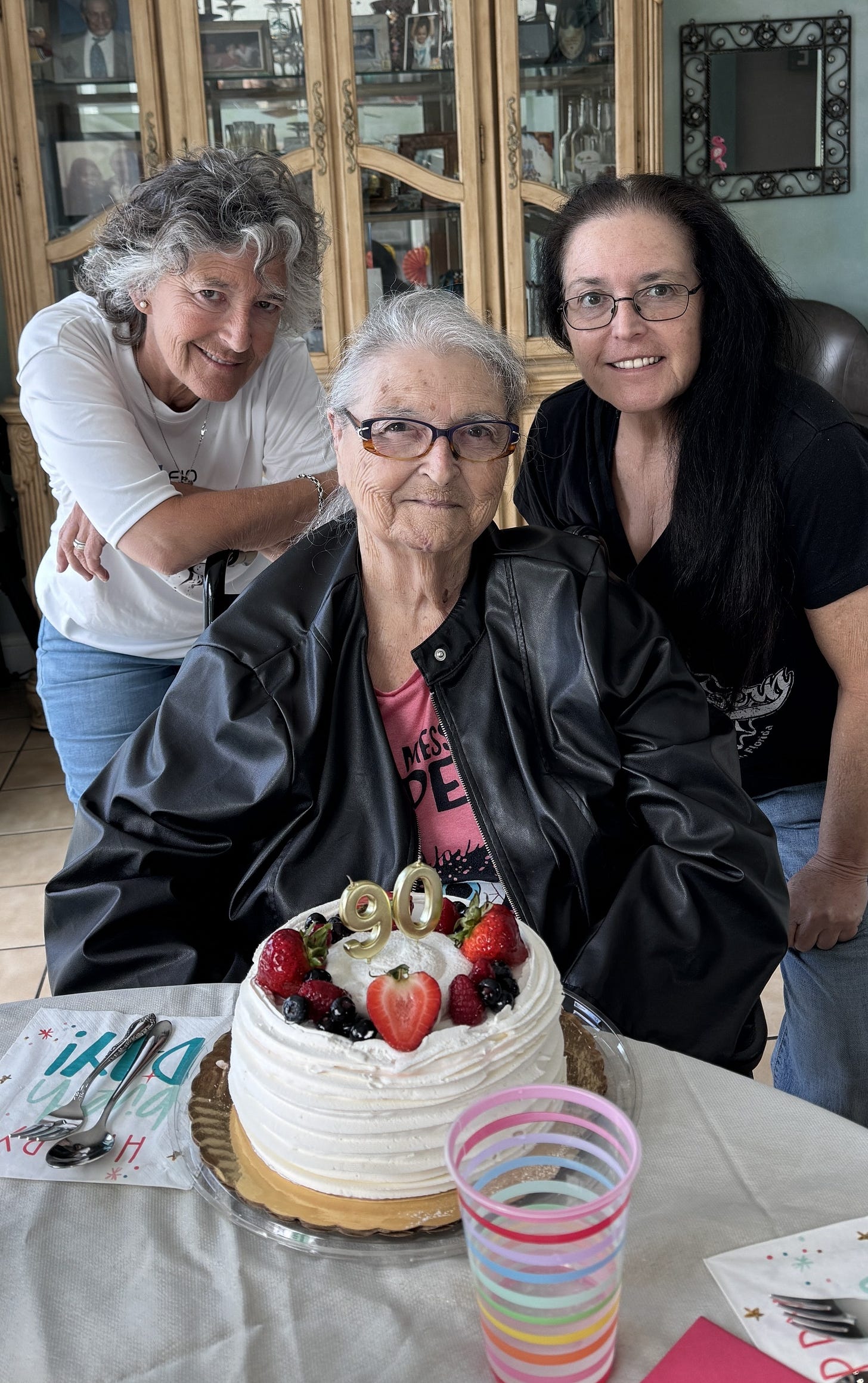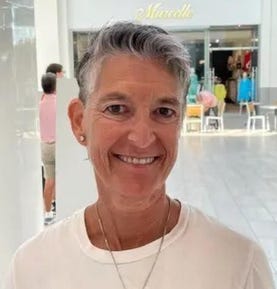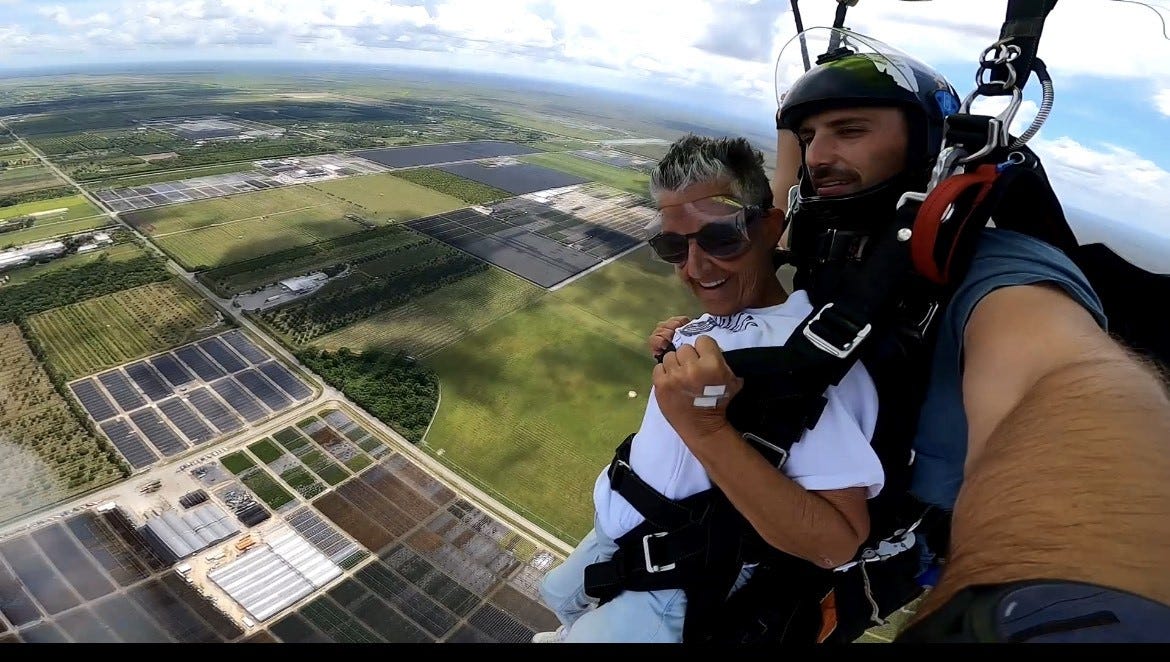In Her Words: Sandra "Sam" Abrams, Never Too Old To Learn Something New
Sam went down a rabbit hole and came back out educating seniors on the Web3 world.
While at the Digital Asset Summit in Miami, our co-founder Sandra Ditore, age 60, met Sandra Abrams, age 64. Ditore was at the summit for her role as SVP of investor relations for Alpha Transform Holdings, a digital asset advisory firm. Abrams, who goes by “Sam,” was there in her capacity as a self-employed Web3 guide. Sam is dedicated to helping the over 60 crowd better understand the Web3 world of blockchain, crypto, metaverse, NFTs, and more. Impressed by her resilience and commitment to lifelong learning, Sandra asked Sam to share her story.
Q: Sandra, your journey into the digital world started quite a while ago. Can you tell us about those early experiences with social media?
A: Absolutely. It all began with Vine, that six-second video app; that was years ago. When Vine shut down, a group of us who had connected there moved to another app called Byte. That was my first taste of getting money for my content.
Q: Was that before you became heavily involved in decentralized social media with a monetary aspect?
A: On Byte, we were just making silly videos for fun. Eventually, that app was sold, and our group migrated to TikTok. Our connections were always based on shared interests. That's how my social media journey really kicked off.

Q. What about other platforms like Twitter? When did you start using those?
A: I've been on Twitter since 2009. Back then, it was all about cat videos, indie music, and posting silly jokes to each other. It was a very different landscape.
Q: Tell us about your early encounter with Bitcoin around 2016.
A: I was waitressing full-time at night, and my younger coworkers who were in their early 20s were talking about Bitcoin. I overheard them, rushed home, and bought three whole Bitcoin on Robinhood! I was in my late 50s at the time, and then I saw something on CNN about Bitcoin and the black market and I panicked and sold them as quickly as I could, thinking I’d narrowly escaped a scam.
Q: What changed your perspective on Bitcoin?
A: About a year and a half later, someone gave me The Book of Satoshi, which detailed everything about Bitcoin from the beginning – how it works, what it is. I thought it was an interesting story, but I just put the book in a drawer and didn't think much more about it for some time.
Q: You shared a story about your early photography in Memphis. How does that relate to your current interest in Web3?
A: That story illustrates my tendency to jump into things driven by a fear of being left behind and not understanding what's happening in society. Back in Memphis, I took my dad's old camera and photographed downtown on film. I accidentally double-exposed a roll, and the results were phenomenal. I ended up with one where the cherub fountain looked like it was sitting on a historic building. I had a couple of small shows and sold some prints. That experience taught me the value of unexpected outcomes and the potential in new ventures, even if I don't fully grasp them initially.

Q: Fast forward to August 2021, when you started getting involved with NFTs. What sparked that interest?
A: COVID hit, and as a waitress in South Florida, I was struggling. I kept hearing about NFTs but didn't understand the terminology at all. However, remembering my photography experience, I decided to dive in, even though I didn't fully comprehend what I was doing.
Q: What were your initial steps into the NFT space?
A: I got on OpenSea and started posting images. I even turned pictures of my teddy bear into cartoon-like NFT things, thinking that's what it was all about. It quickly became clear that I was out of my depth. I knew I needed to learn.
Q: How did you approach learning about this new world of Web3?
A: I started with just five minutes a day, focusing on the vocabulary I was hearing. I'd write down terms like "blockchain" and "regenerative finance." With my master's in nonprofit, I have experience writing curriculum, so I essentially created my own curriculum to learn. Since August 2021, I've been consistently learning.
Q: How did you realize there was a need to educate others, particularly senior citizens, about these topics?
A: Around December 2021 or January 2022, people on TikTok started noticing I was learning and sharing what I was discovering. I realized that many seniors, especially in South Florida where I live, needed to understand cryptocurrency and what was happening in the digital world. I felt like I had made a mistake by not understanding Bitcoin earlier, and I wanted to help others avoid that.
Q: How did you initially try to reach the senior demographic?
A: I initially tried talking about it on TikTok, but my audience there was primarily focused on fitness. Someone suggested I start teaching seniors, which I initially dismissed. I ended up with a large following but very little engagement on that topic.
Q: How did the Web3 business group you were in influence your journey?
A: Joining that group and participating in spaces helped me understand the business side of Web3. I learned about pitching, structuring videos, and the importance of a hook and solving a problem in content creation.
Q: What was your pivotal experience at NFT Con Miami?
A: Yes, in April 2022, some people I'd connected with online invited me to volunteer at NFT Con Miami. I figured it would be a great way to experience the community in person. Before I went, they asked me for a summary of my ideas on onboarding seniors to Web3. I quickly put together a five-phased project, not even fully realizing I had already been doing much of it for the past few years because of Onboard60.
I went thinking I'd just be helping out, getting water for speakers and such. But a speaker didn't show up, and the woman I was volunteering for told me I was going on stage in five minutes to talk about onboarding seniors!
Q: What did you talk about on stage?
A: I just started speaking from the heart about providing education and a safe space for seniors to learn about Web3. People asked questions, and I tried to relate it to things they already understood, like digital credit card transactions. I even shared my own early experience with Bitcoin and how initially scared I was. It was a ten-minute whirlwind!
Q: That impromptu speech led to a mentorship, correct?
A: Yes, after I got offstage, I immediately asked the woman who put me up there if she would be my mentor, and she agreed! Her business partner, a life coach, also became a mentor. They had a podcast and online presence called “Freedom with NFTs.” This group has since become a private business group with Lauren Turton Entrrprises.
Q: How did these mentorships help you further your goals?
A: They taught me the practical aspects of building an online presence and business in this space – how to pitch, structure content, and engage an audience. I continued learning and eventually started my own spaces on Twitter.
Q: Tell us more about your online spaces and the content you created.
A: On Twitter, I started "Get Ready With Me Mondays," where I'd chat about weekly goals and how people were doing. On Wednesdays, I hosted spotlight interviews with prominent figures in the Web3 space. I also continued to learn from others' spaces.
I realized the importance of connecting seniors with their grandchildren in the metaverse, particularly on platforms like Roblox. I wanted to create accessible virtual spaces where they could interact beyond just video calls. So, I built an office, an auditorium, and an art gallery in Spatial. However, I hit a wall with my technical skills in editing and navigating the platform. While people offered help, I struggled to understand their instructions.
I also started repurposing my TikTok videos on YouTube, aiming to be present on multiple platforms. I even started a Substack, not necessarily to sell anything, but as a space to process and share my overwhelming experiences in this new world. Eventually, I learned how to add links and create a Stan Store. Throughout this journey, I kept journals.
In May 2022, I attended Permissionless in West Palm Beach. It was there that my journals unexpectedly became the foundation for my first book – more of a warning than anything else.
Q: You mentioned an experience at Permissionless with a new social media platform called Lens. Can you elaborate on that?
A: Yes, at Permissionless, there was a buzz around Lens Protocol. I had a negative initial reaction because it involved scanning a QR code, which reminded me of an earlier experience with people promoting “shit coins” at a dinner. I had walked out of that dinner because it felt like a scam. So, at Permissionless, when they asked everyone to scan the QR code for an invitation to Lens, I was skeptical and didn't participate.
However, after processing everything I learned at the conference, I realized what Lens was. I started messaging the founder on Twitter for months, explaining my initial hesitation and expressing my genuine interest in being part of the platform. Finally, in December 2022, he gave me my own profile. Lens has since opened up and has various decentralized social apps built on top of it.
Q: Your journey has led you to become an advisor and consultant for senior citizens in the Web3 space. Can you tell us more about that?
A: My focus now is on helping seniors understand the new financial markets and how technology can enhance their quality of life. I aim to bridge the gap between the digital native generation and older adults, providing them with the knowledge and confidence to navigate this evolving landscape safely.
Q: You mentioned your master's in nonprofit management. How has it influenced your current work?
A: It taught me how to write curriculum and how to effectively teach and guide others. A master's program emphasizes showing and demonstrating, which is crucial for helping seniors understand complex topics. It also equipped me with the skills to create programs and structure information logically, as seen in my ability to quickly put together that onboarding proposal.
Q: It sounds like a natural extension of your personality to want to help others.
A: Yes, it's interesting. I recently learned that in Christianity, Sandra means "helper." I had always thought it was just a Brazilian name. It seems my inherent desire to assist others aligns with the meaning of my name.
Q: .Looking back at your journey, what are you most proud of?
A: I think what I'm most proud of is my resilience and willingness to keep learning and growing. I was determined not to be left behind by societal changes. While I can't always keep up with the rapid pace of innovation, I'm proud that I consistently push myself to learn, even when it feels overwhelming. The connections I've made with people who can help and empower senior citizens – accountants, lawyers, and individuals in various Web3 platforms – are also a significant source of pride. Building an online school on Geneva and learning Discord, despite the initial intimidation, were also important achievements for me. Ultimately, I'm proud of my ability to create resources and provide guidance to a demographic that often feels excluded from these technological advancements.
Q: You've touched on the challenges of navigating the Web3 space, including scams and misinformation. How do "grit, grace, and growth" resonate with you from your experiences?
A: For grit, it's about the sheer determination to keep going despite feeling overwhelmed, confused, and even ridiculed. There were many times I wanted to give up, but that fear of being left behind fueled my persistence.
Grace comes from the mentors and the unexpected kindness of strangers who took the time to explain things to me, a "senior" in a young, fast-paced world. It's also about being forgiven of my own missteps and learning from them without harsh self-judgment, like my initial Bitcoin blunder.
Growth is the continuous process of learning and evolving. It's not about becoming an expert overnight but about consistently taking small steps, even if it's just learning one new term a day. It's about embracing the discomfort of the unknown and celebrating each milestone, no matter how small. My journey from Vine to Web3 is a testament to the power of continuous growth.
Q: Finally, if you could go back and speak to your 25-year-old self, knowing what you know now, what advice would you offer?
A: Oh, that's a wonderful question. I would tell my 25-year-old self to be more open to new technologies and not to dismiss things just because they seem confusing or are outside my immediate understanding. I would say, "Don't be afraid to ask questions, even if you think they sound silly." I'd also emphasize the importance of building a strong network and connecting with people from diverse backgrounds and age groups, as you never know where those connections might lead. And most importantly, I'd say, "Trust your instincts, but don't let fear prevent you from exploring new opportunities. Embrace lifelong learning, because the world is constantly changing, and staying curious will enrich your life in ways you can't even imagine."
Editor’s Note: We did things differently this time. Given that Sam’s story is centered on the fast moving digital world, we recorded the one-hour interview, went through one round of edits and, for the first time, ran it through Google Gemini. Our prompt was “rewrite this interview in a Q&A fashion.” This version is pretty close to what Google Gemini returned. It’s still In Her Words but with a Google Gemini reorganization and a final BCS editorial touch.
Sandra “Sam” Abrams, 64, lifelong learner turned Web3 guide. Sandra is a SheFi 10 grad helping women 50+ navigate AI, blockchain, and health tech with calm and clarity. She launched Onboard60 and offers 1:1 Clarity Calls to make sense of what’s next. Tech can feel overwhelming. Sandra makes it personal, possible, and even fun.
You can subscribe to Sam’s updates on My Journey Down the Web3 Rabbit Hole on Substack. You can also follow her on Sandra Abrams | LinkedIn.




